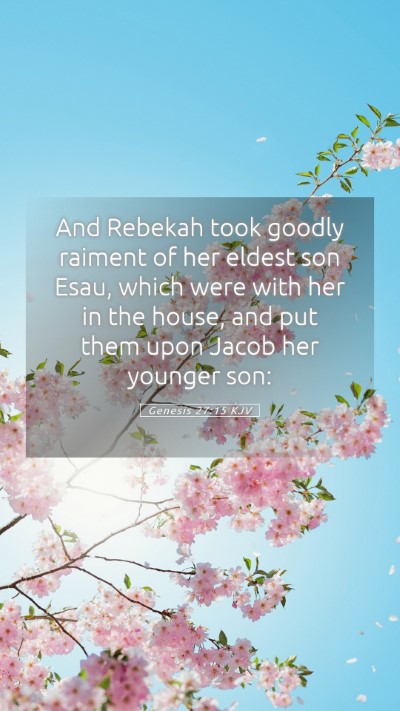Understanding Genesis 27:15: A Comprehensive Analysis
Genesis 27:15 states: "Then Rebekah took the best garments of her elder son Esau, which were with her in the house, and put them upon Jacob her younger son." This verse serves as a critical point in the narrative of Jacob and Esau, highlighting themes of deception, familial loyalty, and the fulfillment of divine prophecy.
Bible Verse Explanation
The act of Rebekah dressing Jacob in Esau's garments is laden with meaning. It symbolizes the lengths to which individuals may go to achieve their objectives, even when such actions involve deceit. This moment in Scripture illustrates human nature's complex interplay with divine intention.
Bible Verse Interpretations
- Matthew Henry's Commentary: Henry emphasizes Rebekah's cunning as she orchestrates the events leading to Jacob receiving Isaac's blessing. He notes that her actions were motivated by love for Jacob and fear that Esau would receive the blessing instead.
- Albert Barnes' Commentary: Barnes highlights the significance of the garments. They represent authority and blessing, and by donning Esau's clothes, Jacob associates himself with Esau's position, a central theme throughout the narrative.
- Adam Clarke's Commentary: Clarke points out the cultural context of the time, suggesting that clothing carried significant weight in familial relationships. He proposes that the garments symbolize an identity that Jacob seeks to claim through deception.
Biblical Exegesis: Thematic Elements
This verse encapsulates key themes that resonate throughout Scripture:
- Deception and Manipulation: The narrative raises questions about the morality of Rebekah's and Jacob's actions. Although their ultimate goal aligns with God's prophecy, the means employed provoke ethical discussions.
- Divine Sovereignty: Rebekah's actions, while deceptive, serve to fulfill God's earlier prophecy to her regarding her sons (Genesis 25:23). This interplay between human actions and divine will is a recurrent theme in Scripture.
- Familial Conflict: The relationship dynamics present a picture of familial strife, a theme seen in many biblical narratives, where God works through imperfect family situations to fulfill His purposes.
Application of Biblical Lessons
Reflecting on Genesis 27:15 within the context of modern life provides valuable insights on the moral implications of our decisions:
- Consider the consequences of our actions and the importance of integrity in our dealings, recognizing how deceit, even for noble reasons, can lead to lasting repercussions.
- Recognize and respect the complexities of familial relationships. Understanding that goals may be achieved through various means invites discussions about ethical boundaries.
- Reflect on how God’s sovereignty operates within our personal narratives, guiding and directing our life's path even amidst moral ambiguity.
Historical Context of Genesis 27:15
Understanding this verse requires awareness of the broader narrative and its historical context:
- The significance of the patriarchal blessings and the customs surrounding inheritance in ancient Israelite culture play crucial roles in this story.
- Gender dynamics, evident in Rebekah's active role in securing Jacob's future, offer insights into the cultural expectations of men and women during Biblical times.
- The tensions between Jacob and Esau serve to highlight the human condition, making struggles relatable across generations.
Cross References
Genesis 27:15 connects to other scripture that expands its meaning:
- Genesis 25:23: God's prophecy regarding the roles of Jacob and Esau;
- Genesis 27:1-4: The context of Isaac's desire to bless Esau;
- Genesis 28:1-4: Jacob receiving the blessing after the deception, affirming God’s plan despite human failings.
Conclusion
Genesis 27:15 serves as a profound reminder of human nature entwined with divine purpose. It exhorts believers to seek understanding of Scripture not only for intellectual growth but for personal application. Through deeper Bible study insights, one can grasp broader themes and moral lessons, essential for both personal and communal Bible study groups.


